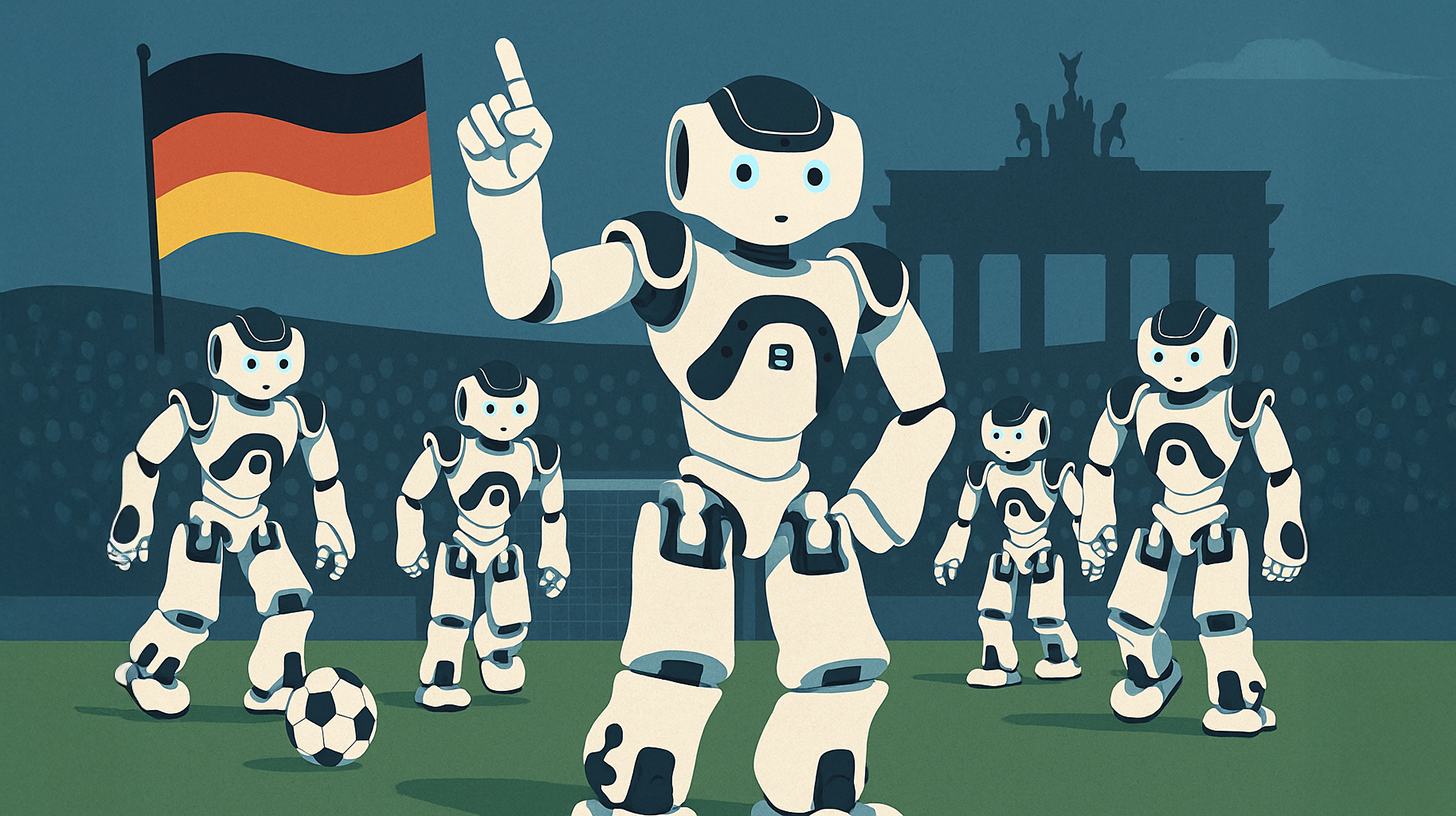
German robot teams set international standards: B-Human dominates Robocup with eleventh world championship title-Image: Xpert.digital
Germany dominates Robocup World Championships thanks to top research in robotics and AI
Robocup successes show that Germany leads to robotics and artificial intelligence worldwide
Robotics and artificial intelligence have developed into one of the most important research fields of the 21st century, with Germany playing a leading role in top international research. This technological supremacy is particularly impressive at the Robocup World Championships, where German teams regularly perform top performance and expand the limits of the technically feasible.
The last tournament, in which German robot teams such as B-Human set international standards, was the Robocup German Open 2025, which took place in Nuremberg from March 12 to 16, 2025. There the B-Human team from Bremen dominated the standard Platform League again and won with an impressive record of 73 goals and no goal.
The team B-Human of the University of Bremen and the German Research Center for Artificial Intelligence was able to win the title for the eleventh time at the 2024 Robocup World Championship. With an impressive goal difference of 86: 1, the German robots demonstrated their technical superiority.
The Robocup as Catalyst of Robotics Research
Since its foundation in 1997, the Robocup has become one of the most important international research initiatives. The original vision of developing a fully autonomous humanoid robot team by 2050 that can exist against the reigning human football championship team appears less utopian today than at the time of the first discontinuation in Nagoya.
This ambitious objective serves as a powerful engine for technological breakthroughs in various areas of robotics. The annual competitions act as living laboratories in which research teams from all over the world can test and develop their latest developments under realistic conditions. It is no longer just about playing football, but about the development of intelligent systems that can autonomously master complex tasks.
Suitable for:
- The AI-controlled robotics and humanoid robots: hype or reality? A critical analysis of the market maturity
B-Human: Germany's robotics presentation
The team B-Human of the University of Bremen and the German Research Center for Artificial Intelligence (DFKI) embodies German Excellency in robotics research. At the 2024 World Cup in Eindhoven, the team achieved an impressive triumph: With an overwhelming goal difference of 86: 1, the autonomous NAO robots already secured the eleventh world championship title in the standard Platform League.
This success is the result of years of systematic research and development. The 26-member team of students, supported by an alumnus and two doctoral students, works under the scientific direction of Dr. Thomas Röfer from the DFKI research area Cyber-Physical Systems and Dr. Tim Laue from the working group multisensory interactive systems at the University of Bremen. The continuous further development of software architecture, world modeling and image processing has made B-Human one of the most successful teams in the history of the Robocup.
B-Human's success story continues in 2025: At the Robocup German Open 2025 in Nuremberg, the team again triumphed with a flawless balance sheet and an impressive goal difference of 73: 0. This dominance not only shows the technical superiority, but also the continuous innovation and adaptability of the team in constant changing regulations and challenges.
Technological foundations and Nao robots
In the standard Platform League, all teams use identical humanoid Nao robots from Softbank Robotics. This standardization ensures that the success depends exclusively on the quality of the software developed and not on different hardware requirements. The NAO robot, originally developed by Aldebaran Robotics and introduced in 2008 as the successor to the Sony Aibo, has established itself as an ideal platform for robotics research.
The technical specifications of the NAO V6 are impressive: with a height of 58 centimeters and a weight of 5.5 kilograms, the humanoid robot has 25 degrees of freedom that enable natural movements. Equipped with two HD cameras, four directed microphones, various touch sensors and an Intel Atom E3845 processor, the robot can perceive its surroundings precisely and make decisions autonomously.
The programmability in different languages such as C ++, Python and Java, combined with the visual development environment Choregraph, makes the NAO a varied research platform. This flexibility enables the teams to develop and implement complex algorithms for image processing, speech recognition, movement control and strategic game planning.
Diversity of the Robocup disciplines
The modern robo cup includes much more than just playing football. The different leagues address different aspects of robotics research and reflect real application scenarios. In the Robocup@Home League, service robots have to cope with household tasks, while the Robocuprescue League simulates rescue scenarios in which robots have to find and recover. The Robocup Industrial League, also known as Logistics League, focuses on automating industrial production processes.
This diversification shows the broad applicability of the developed technologies. The team SWOT of the Technical University of Würzburg-Schweinfurt, which won the Robocup@Work World Championship 2024, won a particularly impressive example. In this league, robots in a simulated Smart Factory to autonomously recognize workpieces must recognize, handle and transport - skills that are used directly in modern Industry 4.0.
International dimension and scientific exchange
The global range of the Robocup is impressive: 300 robot teams from 45 countries competed against each other at the 2024 World Cup in Eindhoven. This international participation creates a unique platform for scientific exchange and cross -border cooperation in robotics research.
The participants, which mainly come from universities and research institutions, but also include industrial teams, bring various cultural approaches and technical philosophies with them. This exchange leads to innovative solutions and significantly accelerates the technological development. The symposia and workshops that take place in parallel to the competitions make it possible for researchers to present their latest findings and initiate new cooperation.
Promotion of young talent and educational impact
A special focus of the Robocup is on the promotion of young talent by the Robocupjunior leagues. Pupils between the ages of 10 and 19 can demonstrate their skills in various categories such as soccer, rescue and onstage. This early introduction of robotics and programming is crucial for the development of future specialists in the MINT areas.
However, the educational effect of the Robocup extends far beyond the competitions. Many participating students develop the skills and interest that they later bring in successful career in robotics research or in technology-oriented companies during their robocup career. Some even found their own start-ups and thus contribute to the economic recovery of the developed innovations.
German robotics research in an international context
Germany occupies a top position in the international robotic landscape. The country has the largest robotics market in Europe and has the fourth highest robot density worldwide. This strong position is supported by systematic research funding and the close cooperation between universities, research institutions and industry.
The Action Plan Robotikforschung and the Robotics Institute Germany (RIG) initiated by the Federal Ministry of Education and Research bundle national skills and strengthen international competitiveness. The Robocup German Open, which have developed into the most important regional European Robocup competition, play a central role as a shop window for German robotics research.
Technological challenges and innovations
The continuous further development of the Robocup rules presents the teams with new technical challenges. Every year the rules of the game are gradually adapted to human football, which requires innovative solutions. In the standard Platform League, for example, the focus is increasingly the focus on interaction with human referees, whereby the robots recognize visual gestures and process acoustic signals such as whistles.
These challenges drive technological breakthroughs in different areas. The development of advanced computer vision algorithms enables robots to analyze complex game situations and make strategic decisions. Improved movement control and equilibrium control allow more dynamic moves and more robust performance under different environmental conditions.
Outlook and future developments
The Robocup's vision of developing a competitive robot team against human professional footballers by 2050 is closer to every year. The rapid progress in artificial intelligence, sensor technology and robotics hardware create the basics for more and more efficient autonomous systems.
At the same time, the areas of application of the technologies developed in the Robocup are continuously expanding. From geriatric care to agriculture to disaster relief, intelligent robots open up new opportunities for coping with social challenges. The demographic development and the shortage of skilled workers in many industrialized nations increase the need for autonomous systems that can sensibly complement human workers.
Suitable for:
International competition and cooperation
While German teams like B-Human celebrate international successes, global competition is also constantly developing. Teams from Asia, North America and other European countries bring their own technical approaches and cultural perspectives into robotics research. This diversity enriches the entire research field and leads to innovative solutions that would not have come up with a single team alone.
Particularly noteworthy is the growing participation of teams from emerging countries, which often develop creative and efficient solutions with limited resources. This diversity strengthens the international character of the Robocup and contributes to the global spread of robotics skills.
The successes of German robot teams at the Robocup impressively demonstrate the performance of the domestic research landscape. With teams such as B-Human, who have already won eleven world championships and innovative approaches in various robotics disciplines, Germany is based internationally in the development of autonomous systems. The Robocup has established itself as an indispensable platform for technological innovation, scientific exchange and promoting young talent. The technologies and competencies developed here will make a decisive contribution in the coming years to cope with the great social challenges of the 21st century and to consolidate Germany as a leading location for intelligent robotics.
Suitable for:

